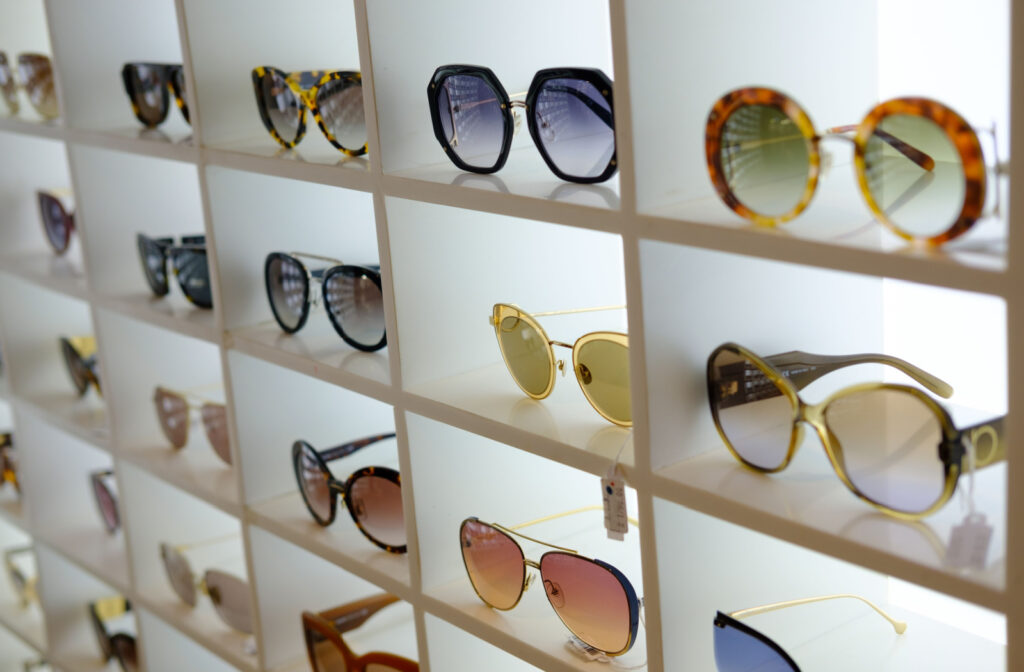Eye protection is something we often take for granted until it’s too late. Whether you’re stepping out for a sunny day at the beach or working in a high-risk environment, protecting your eyes is crucial.
Sunglasses and safety glasses each have their place, offering unique benefits tailored to different needs. Sunglasses protect our eyes from the sun but not necessarily from impact, and safety glasses are typically the other way around. The exception to this would be if a person buys specialty safety eyewear, which we’ll discuss in more detail below.
You can choose the correct eyewear for any situation by understanding the differences. One thing to note is that starting with an eye exam may be a good idea if you haven’t had one for a while. Your eye doctor can determine if your prescription has changed. That way, you don’t order new prescription sunglasses only to discover your prescription has changed.
How Sunglasses Work
Sunglasses aren’t just about looking cool—they’re mini shields for your eyes. You should ideally look for sunglasses that block 100% of UVA and UVB radiation, the harmful components of sunlight that can damage your vision over time.
The secret to their protection lies in the special coatings in the lens, designed to absorb UV radiation. Think of it as sunscreen for your eyes, minus the sticky residue. Polarized lenses go further by reducing glare from reflective surfaces, providing a clear, more comfortable vision in bright conditions.
The Health Benefits of Wearing Sunglasses
Wearing sunglasses isn’t just about comfort, either—it’s about good long-term ocular health. Sunglasses should be a part of your long-term eye disease protection plan.
Prolonged exposure to UV rays can lead to serious eye conditions such as cataracts, age-related macular degeneration (AMD), and pterygium. Age is a significant risk factor for things like cataracts and AMD, but sunglasses act as a barrier and can reduce the risk by eliminating some UV exposure.
Choosing the Right Sunglasses
Not all sunglasses are created equal. Here’s what to consider when picking them:
- UV protection: Always check for a label that says 100% UV protection or UV400. This ensures the lenses shield your eyes from both UVA and UVB rays.
- Lens color: While lens color doesn’t affect UV protection, it does influence how you perceive colors and contrast. Gray lenses are great for true color perception, while brown and amber lenses enhance contrast, making them ideal for sports or overcast days. So, think about what you’ll be doing while wearing your sunglasses and base your color choice on something that fits your lifestyle the best.
- Fit and coverage: Sunglasses should fit comfortably on your face without slipping. Oversized or wraparound styles offer extra protection by blocking UV rays from entering at different angles, which may be beneficial in some scenarios.

The Importance of Sunglasses for Different Activities
Different activities require different levels of eye protection. Things to consider:
- Everyday wear: A pair of stylish sunglasses with 100% UV protection is likely sufficient for most people’s daily activities.
- Sports and outdoor activities: Whether you’re running, cycling, or hiking, opt for sunglasses with polarized lenses to reduce glare and enhance performance. Ensure you still double-check for UV protection. Polarized lenses don’t automatically include UV protection.
- Water and snow sports: Reflective surfaces like water and snow can intensify glare versus other environments making polarized lenses a good choice. Wraparound lenses could also be very beneficial for these environments.
Safety Glasses vs. Sunglasses
Sunglasses and safety glasses are technically both designed to protect our eyes, but they usually have some significant differences. Sunglasses are designed primarily for aesthetic appeal and comfort. They protect your eyes from the sun’s harmful rays and reduce glare, making outdoor activities more enjoyable and safe.
On the other hand, safety glasses protect against hazards like flying debris, chemical splashes, and other potential dangers often found in workplaces or recreational activities. They adhere to stringent safety standards and offer features beyond UV protection.
What About Safety Sunglasses?
But superstars out there are working hard to build our towns and cities. These individuals spend long days in the sun, potentially around flying debris, and they need UV and physical protection. That’s where a specialty safety eyewear that is tinted, offers UV protection and is rated for impact protection can be a huge bonus.
Plus, many of these types of safety sunglasses can be manufactured with an individual’s prescription. So, someone never has to choose between seeing clearly or protecting their eyes.
Get Help Choosing Your Next Eyewear
There are many ways to protect our bodies from harm—sunglasses and safety glasses being 2 great options. Knowing how they protect your eyes is critical for choosing the correct eyewear for your needs and lifestyle. But this is only the beginning.
The next step is choosing your next sunglasses or safety glasses so you’ll have something to protect those peepers with. Stop by one of our locations at Griffin Optometric Group, now operated by Total Vision.




